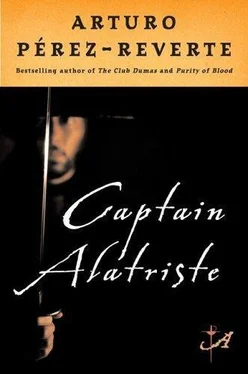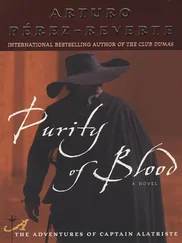Arturo Perez-Reverte - Captain Alatriste
Здесь есть возможность читать онлайн «Arturo Perez-Reverte - Captain Alatriste» весь текст электронной книги совершенно бесплатно (целиком полную версию без сокращений). В некоторых случаях можно слушать аудио, скачать через торрент в формате fb2 и присутствует краткое содержание. Жанр: Старинная литература, на английском языке. Описание произведения, (предисловие) а так же отзывы посетителей доступны на портале библиотеки ЛибКат.
- Название:Captain Alatriste
- Автор:
- Жанр:
- Год:неизвестен
- ISBN:нет данных
- Рейтинг книги:3 / 5. Голосов: 1
-
Избранное:Добавить в избранное
- Отзывы:
-
Ваша оценка:
- 60
- 1
- 2
- 3
- 4
- 5
Captain Alatriste: краткое содержание, описание и аннотация
Предлагаем к чтению аннотацию, описание, краткое содержание или предисловие (зависит от того, что написал сам автор книги «Captain Alatriste»). Если вы не нашли необходимую информацию о книге — напишите в комментариях, мы постараемся отыскать её.
Captain Alatriste — читать онлайн бесплатно полную книгу (весь текст) целиком
Ниже представлен текст книги, разбитый по страницам. Система сохранения места последней прочитанной страницы, позволяет с удобством читать онлайн бесплатно книгу «Captain Alatriste», без необходимости каждый раз заново искать на чём Вы остановились. Поставьте закладку, и сможете в любой момент перейти на страницу, на которой закончили чтение.
Интервал:
Закладка:
This was no time to so much as blink. Captain Alatriste sighed deep inside, realizing that the two Englishmen, whoever they might be and despite the good intentions of the heavier masked man, had been sentenced without reprieve. They were dealing with the Church, and arguing any further would be, in addition to fruitless, dangerous.
"What are we to do?" he said finally, resigned to the inevitable.
"Kill them outright," Fray Emilio replied instantly, the fire of fanaticism blazing in his eyes.
"Without knowing who they are?"
"We have already told you who they are," the masked man with the round head reminded him. "Misters Thomas and John Smith. English travelers."
"And ungodly Anglicans," added the priest, his voice crackling with anger. "But you have no need to know who they are. It is enough that they come from a land of heretics—a treacherous people, anathema to Spain and the Catholic religion. By executing God's will, you will render a valuable service to the All Powerful and to the crown."
Having said this, the priest took out another purse containing twenty gold coins and disdainfully tossed it on the table.
"You see now," he added, "that divine justice, unlike the earthly kind, pays in advance, although over time it collects its return." He stared at the captain and the Italian as if engraving their faces in his memory. "No one escapes His eyes, and God knows very well where to come to collect His debts."
Diego Alatriste made as if to nod in agreement. He was a man with brass, but actually the gesture was an attempt to hide a shudder. The lamplight made the priest look diabolical, and the menace in his voice would have been enough to alter the composure of the bravest of men. Standing beside the captain, the Italian was pale, without his ti-ri-tu, ta-ta or his smile. Not even the round-headed man dared open his mouth.
III. A LITTLE LADY
Perhaps because a man's true homeland is his childhood, despite all the time that has gone by, I always remember the Tavern of the Turk with nostalgia. The place, Captain Alatriste, and those hazardous years of my boyhood are all gone now, but in the days of our Philip the Fourth, the tavern was one of four hundred in which the seventy thousand residents of Madrid could quench their thirst. That comes to about one tavern for every one hundred and seventy-five citizens. And that is not counting brothels, gaming houses, and other public establishments of, shall we say, relaxed or dubious moral ambience, which in a paradoxical, unique, and never-again-to-be-the-same Spain were visited as frequently as the churches—and often by the same people.
La Lebrijana's enterprise was in fact a cellar of the sort where one came to eat, drink, and burn the night away, located on the corner of Calles Toledo and Arcabuz, about five hundred steps from the Plaza Mayor. The two rooms where Diego Alatriste and I lived were on the upper floor, and in a way the den below served as our sitting room. The captain liked to go down there to kill time when he had nothing better to do—which was often. Despite the smell of grease and smoke from the kitchen, the dirty floor and tables, and the mice running around, chased by the cat or looking for bread crumbs, it was a comfortable-enough place. It was also entertaining, because there were frequently travelers brought by post horse, and magistrates, tipstaves, flower vendors, and shopkeepers from the nearby Providencia and La Cebada plazas, as well as former soldiers drawn by the proximity of the principal streets of the city and the mentidero at San Felipe el Real, a center where idlers gathered to gossip. Not to disdain the tavern's attractions—a little faded but still splendid—and the longtime fame of the tavernkeeper and the Valdemoro wines—a muscatel as well as an aromatic San Martin de Valdeiglesias—but the place had another drawing card. It was blessed with a back gate that opened onto a courtyard and the next street, a very handy feature when one was slipping away from sheriffs, catchpoles, creditors, poets, friends in need of money, and other miscreants and inopportune guests.
As for Diego Alatriste, the table that Caridad la Lebrijana reserved for him near the door was commodious and sunny, and sometimes the wine brought with it a meat pie or some cracklings. The captain had carried over from his youth—something he said very little or nothing about—a certain taste for reading. It was not unusual to see him sitting at his table, alone, his sword and hat hung on a peg in the wall, reading the printed version of Lope's latest play—he was the captain's favorite author—recently performed in El Principe or La Cruz. Or it might be one of the gazettes or broadsides featuring the anonymous satiric verses that circulated at court in that time that was at once magnificent, decadent, mournful, and inspired—a time that cast a shadow as black as a curate's cloak over the favorite, the monarchy, and the morning star. In many verses, in fact, Alatriste recognized the corrosive wit and proverbial bad temper of his friend the unredeemed grumbler and popular poet Don Francisco de Quevedo:
Here lies Senor Perez, the swine
Whose life was Satan's appetizer
While his devil's broth was stewing.
No pussy ever meowed to him.
How he rued Herod's misconstruing
The use of power; so much wiser
Not to have slaughtered innocent lambs:
Forsooth! Such succulent cherubim
Should be spared and saved for screwing.
And other pretty bits of the sort. I imagine that my poor widowed mother, back there in her tiny Basque town, would have been alarmed had she had a hint of what strange company my serving as the captain's page had led me into. But as for the young Inigo Balboa, at thirteen he found that world to be a fascinating spectacle, and a singular school of life.
I mentioned a couple of chapters ago that Don Francisco, along with Licenciado Calzas, Juan Vicuna, Domine Perez, the pharmacist Fadrique, and others of the captain's friends, often came to the tavern, and engaged in long discussions about politics, theater, poetry, and routinely, a punctilious appraisal of the many wars in which our poor Spain had been or was then involved. She may still have been powerful and feared by other nations, but she was touched with death in her soul. The battlefields of those wars were skillfully re-created on the tavern table by Juan Vicuna, using bits of bread, cutlery, and jugs of wine. Originally from Extremadura, and badly wounded at Nieuwpoort, he had once been a sergeant in the horse guard, and deemed himself a master strategist.
War had soon become a real and pressing concern, for it was during the affair of the masked men and the
Englishmen, as I recall, that hostilities were renewed in the Low Countries, after the expiration of the twelve-year truce that our deceased and peaceful King Philip the Third, the father of our young monarch, had signed with the Low Dutch. That long interim of peace, or its effects, was precisely the reason so many veteran soldiers were wandering without employ through the Spains and the rest of the world, swelling the ranks of idle braggarts, bullies, and blusterers disposed to hire out for any petty villainy. And among them we may count Diego Alatriste. However, the captain was one of the silent variety, and in contrast to so many others, no one ever saw him boasting of his campaigns or his wounds. And then when the drumrolls of his old company sounded again, Alatriste, like my father and many other brave men, rushed to reenlist beneath the old general of their old tercio, Don Ambrosio de Spinola, and to play their part at the beginning of what today we know as the Thirty Years' War. He would have served on and on had he not received the serious wound at Fleurus.
Читать дальшеИнтервал:
Закладка:
Похожие книги на «Captain Alatriste»
Представляем Вашему вниманию похожие книги на «Captain Alatriste» списком для выбора. Мы отобрали схожую по названию и смыслу литературу в надежде предоставить читателям больше вариантов отыскать новые, интересные, ещё непрочитанные произведения.
Обсуждение, отзывы о книге «Captain Alatriste» и просто собственные мнения читателей. Оставьте ваши комментарии, напишите, что Вы думаете о произведении, его смысле или главных героях. Укажите что конкретно понравилось, а что нет, и почему Вы так считаете.










